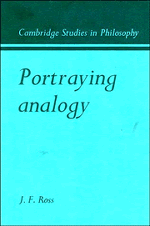Book contents
- Frontmatter
- Contents
- Dedication
- Preface
- Introduction
- 1 The limitations of classical analogy theory and the Miller's Analogies transition
- 2 The genus: meaning differentiation
- 3 Predicate schemes: an explanatory model
- 4 Equivocation, analogy and metaphor
- 5 Denominative analogy and paronymy
- 6 Figurative discourse
- 7 Analogy and religious discourse: craftbound discourse
- 8 Analogy and analysis
- Notes
- Bibliography
- Name index
- Subject index
2 - The genus: meaning differentiation
Published online by Cambridge University Press: 07 October 2011
- Frontmatter
- Contents
- Dedication
- Preface
- Introduction
- 1 The limitations of classical analogy theory and the Miller's Analogies transition
- 2 The genus: meaning differentiation
- 3 Predicate schemes: an explanatory model
- 4 Equivocation, analogy and metaphor
- 5 Denominative analogy and paronymy
- 6 Figurative discourse
- 7 Analogy and religious discourse: craftbound discourse
- 8 Analogy and analysis
- Notes
- Bibliography
- Name index
- Subject index
Summary
MEANING DIFFERENTIATION
Words in English and other Indo-European languages, in suitably contrasting contexts, differentiate. For example, ‘She dropped a stitch’, ‘She dropped her hem-line’, ‘She dropped her book’, ‘She dropped a friend’, ‘She dropped her courses’. The meanings of ‘dropped’ are appropriate, fitted to the completion words and, so, differ. That is the generic linguistic phenomenon that includes mere equivocation, analogy and metaphor.
Words also adapt in predicate mode (e.g. to whether what is ascribed is ascribed as an action, state, proclivity, ability, etc.: ‘Jones plays golf’, ‘Smith plays the piano’, and to whether it is ascribed as a cause, effect, symptom, state, etc.) and to contrasts of ascription: to contrasting implied vantages, e.g. of agent or observer. Predicate mode and ascriptive differentiation are explained in chapter 5.
The meaning of any word, whether it be as common as the nouns, ‘chair’ and ‘ball’, or the verbs, ‘fix’, ‘strain’ and ‘look’, or whether it be statistically less common, like ‘investigator’, ‘interlocutor’, ‘expect’, or ‘anticipate’, differentiates relatively to some of its other occurrences. Consider the sets:
(1) The junk men took the chair.
(2) The chairman of the board took the chair.
(3) He dropped the ball on his first catch.
(4) He skipped the ball because of the late hour.
(5) He fixed the leak in the pipe.
(6) He fixed the time of the appointment.
(7) He fixed the race.
(8) […]
- Type
- Chapter
- Information
- Portraying Analogy , pp. 33 - 53Publisher: Cambridge University PressPrint publication year: 1982



